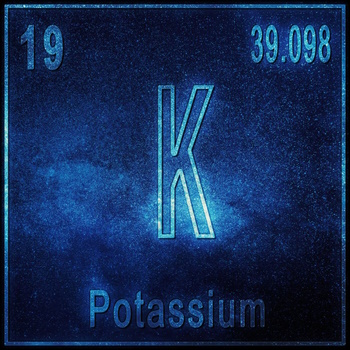A severe on-going lack of potassium can trigger cancer development. Researcher found that low potassium levels contribute to improper cellular functions. Without proper cellular function it is very hard to prevent and reverse cancer.
Therefore, the Budwig Center, believes that all cancer patients need to keep their potassium levels high.
After more than 20 years of providing complementary support for cancer, our research at our health wellness clinic points to chemical toxins as the main cause of cancer. Interestingly, when healthy cells are weakened by toxins, the first thing they lose is their potassium levels.
Next, the cells will take up more salt (sodium) and to restore the cells to normality the cells would often swell up with abnormal amounts of water and becoming “waterlogged”.
This results in those harmed cells now being extremely vulnerable to diseases such as cancer and other chronic illnesses. Because of the lack of electrolytes such as potassium, cancer can now freely take over and have its way with the body.
The Benefits of Proper Potassium Levels
- Helps prevent and treat all types of cancer by lowering the sodium (which cancer likes). Also increases potassium which enables our body to function properly and not develop damaged rogue cells.
- Helps control your blood pressure as it removes extra sodium from your body through your urine. And as we know, too much sodium can cause high blood pressure.
- Potassium also helps the walls of your blood vessels to relax or loosen up. Tense or rigid blood vessels can also lead to high blood pressure.
- Promotes good muscle and nerve health. Potassium helps your muscles flex or contract the way they should, and your nerves need potassium so that they can work well.
- Helps promote normal bowel movements.
- Good potassium levels help to maintaining sustained energy levels.
How Much Potassium Daily?
Some recommend 3,700mg of potassium for the average adult daily. While other experts say we need approximately 5,000 mg/daily. Children need about half that amount. If you feel tired or weak, having difficulty with normal bowel movements or muscle cramps. Or in some cases an irregular heartbeat, these could all be tell-tale signs of a lack of potassium.
Adults with cancer should aim for 7000 to 8,000mg of potassium daily to really push out the excess sodium in the body. This is not easy to do by just consuming foods rich in potassium, therefore a potassium supplement is recommended when treating cancer.
We recommend Potassium Citrate which is what is normally found in natural form in abundance in foods. Please always take Potassium citrate with food, as part of your meal so that it is easily absorbed along with your meal. Take before or right after a meal.
How To Increase Potassium Levels Naturally
Dr. Budwig promoted a vegetarian type of diet, and many fresh fruits and vegetables are rich in potassium. She also feed her cancer patients low fat Quark (Cottage cheese) mixed with flaxseed oil twice a day and both these foods are high in potassium (low-fat or fat-free is best).
If you consume daily 1 baked sweet or red potato, 2 servings of Cottage cheese (or Quark) with flaxseed oil, 1 cup of raw celery, 1 banana, 3 TBPS of Wheat Grass. As well as 1 avocado, 1 cup of cooked or raw spinach, ½ cup tomato puree/sauce, ½ cup of white beans. In addition to 1 cup of greens in a smoothie or juice along with some other fruits and vegetables you will consume approximately 6500mg of Potassium. Try to take extra Potassium supplements to reach the 7000 to 8000mg daily target. People who often feel tired, especially if they are on a mostly liquid juice type diet, are often lacking potassium. We recommend a “green” smoothies and juice approach as greens are rich in potassium and low on glucose. 2 glasses (500ml) of green juices/Smoothies daily would be ideal:
- 1 cup cooked beet greens = 1,320mg
- 1 Baked Potato 926mg
- 1 medium size sweet potato = 950mg
- 1 cup of cooked spinach = 839mg (1 cup of raw spinach = 558mg)
- ½ cup of dried apricots = 750mg
- 1 Avocado = 700mg
- 6 Tablespoons of Flaxseed oil = 680mg
- ½ cup dried prunes = 650mg
- 2 Tablespoons Wheat Grass (powder or juice) 640mg
- ½ cup of tomato puree = 530mg
- 1 cup plain nonfat yogurt = 500mg
- ½ cup white beans = 477mg
- 1 banana = 400mg
- 1 cup low fat Cottage Cheese/Quark = 400mg
- 1 cup raw celery = 260mg
- 1 cup raw watercress = 330mg
- 1 cup blueberries = 113mg
Possible Side Effects
Do not overdose on potassium even in the powder form as it can cause issues in the stomach, abdominal pain, nausea, tendency of vomiting, acidity etc. So if you experience any of these symptoms reduce the amount of potassium intake. If you would like to know more about how we feature potassium in our natural cancer treatments, contact us today.
Budwig registered “Patients” please go to “Patients Area” for information on the recommended MCP, Thyroid Extract and Potassium/Iodine remedies, dosage, instructions and suppliers.
For more information:
